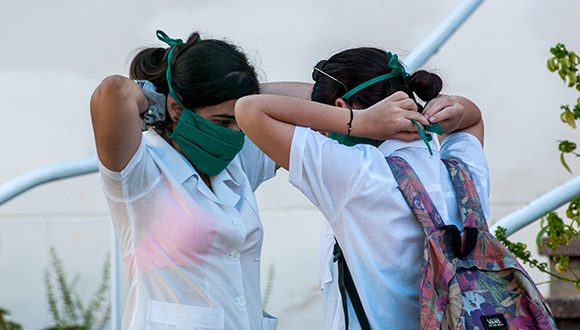
Covid-19:
Does Panic Help in Pandemic Situations?
By Danay Galletti Hernández
March 24, 2020
Translated and edited by Walter Lippmann for CubaNews.

Medical students during the investigation of COVID-19. Photo: Abel Padrón Padilla/Cubadebate
Hysteria is as dangerous as social apathy, said Dr. Annia Duany, head of the Psychiatry Group at the Hospital Docente Clínico Quirúrgico Salvador Allende in Cuba, She said that confidence in the social measures taken in Cuba against COVID-19 is essential.
Panic does not help in pandemic situations and a favorable mood affects the prevention and treatment of diseases, Dr. Duany told Prensa Latina.
“It’s normal in this situation for people to experience nervousness, worry, anxiety and fear, but it’s essential to have positive coping resources. Examples being with family, seeking reliable and safe information, doing tasks and enriching our spiritual world,” he said.
On the other hand, Dr. Ana Sarracent, head of the Psychiatry Group at the Calixto Garcia Hospital, explained that although there is a risk of contagion at any age, epidemiological research indicates that those over 60 are more vulnerable to Covid-19.
“In these cases, family support is transcendental because they are more sensitive from the psychological and organic point of view. Also, extreme care and hygiene must be taken, as well as those with nervous or cognitive disorders, to ensure that they enjoy positive and happy materials,” she said.
The research work implemented to identify flu symptoms in the population and possible cases of the pandemic also reveals a significant number of adults who live alone and, therefore, need community support, Sarracent added.
They tend to have a hypochondriacal view of diseases and their situation of loneliness, as well as a diverse perception of the news broadcast on the subject, he said.
In coming days, numerous Cuban residents will arrive in the Caribbean nation and will be under isolation in response to a protection measure. The family, far from being distressed or depressed, must be aware and assume it in an appropriate manner, he said in reference to the most recent measures taken by the authorities.
About the children and how they should be treated in this context, Dr. Mabel Whilby, head of the Infant-Juvenile Group at the Pediatric Teaching Hospital of Cerro, Havana, explained that this sector of the population has different stages in psychological development and should receive information age appropriately.
The family must convey to the children that this situation will soon return to normal and then they will be able to play again with their friends, she said.
Children also have emotions, sadness and fears and must channel them, and at the same time, their parents must instill security and confidence in them through play, she added.
In this sense, conversations between adults cannot take place in front of children because they are too aware of the signs of how adults handle this situation, as they are patterns to imitate.
The specialists agreed on the importance of risk perception and insist that isolation and surveillance in homes be assumed with appropriate behavior: avoiding alcoholic beverages, smoking or neglecting eating habits.
Questions and rumors about COVID-19

You must be logged in to post a comment.